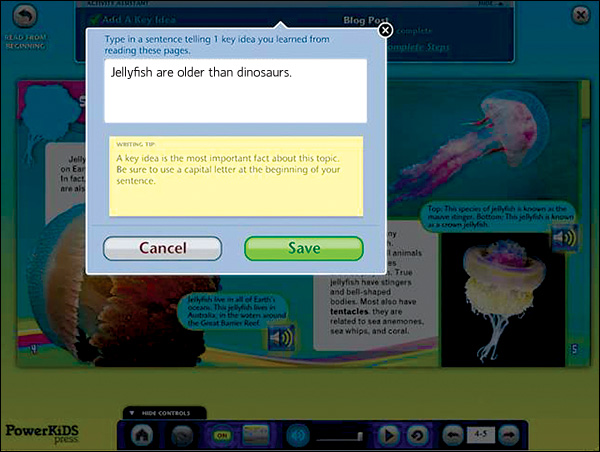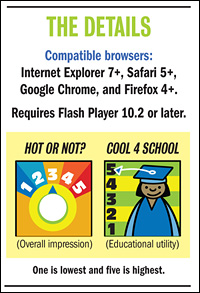 Screenshot from Rosen Interactive Ebooks.
Screenshot from Rosen Interactive Ebooks.
Rosen Digital has introduced a free, interactive ebook platform that customers can populate, à la carte, with unlimited, simultaneous access licensed, nonfiction titles for $34.95 each or $209.70 for a set of six.Sixty titles are currently available and an additional 60 will be released in January 2013.
The ebooks feature colorful designs, eye-popping photographs, plenty of maps, charts and sidebars—and even video clips. And they’re perfect for individual use or classroom sharing via an interactive whiteboard. Young learners can explore the ebooks at their own pace, reading selections independently or choosing to listen to them read by a professional narrator with optional text highlighting, making them perfect for emerging and mature readers alike. While the interactive ebooks are excellent in themselves, what really distinguishes them are the instructional activities students can complete as they read the selections.
Targeting Common Core standards, which focus on reading, writing, and expressing understanding through various digital media, each ebook comes with three integrated lesson options created by Shannon Miller, a district teacher librarian and technology specialist at Van Meter (IA) Community School.

In one ebook series called “Speed Machines,” for example, students reading the title Alfa Romeo can be asked to summarize the main ideas by writing an email expressing their opinion, designing an informative Web page, or introducing the sports car company in a social network profile. If they choose to do the latter, they won’t be posting to Facebook. Instead, each dual-page view has an “activity assistant” workspace above it, which prompts students to do things—generally based on their understanding of the two pages of content. Students who opt to create a social network profile select a username above one two-page spread, then choose a profile picture from a set of Alfa Romeo images that pop up, and so on. Then they gradually complete their mock-profile learning activity as they read and write in an environment that’s safe, self-contained, and doesn’t require students to set up individual accounts. Same deal with blogs, wikis, Web pages, and other activities: students learn about publishing in various digital media through simulations that can only be printed or emailed.
On the other hand, the printable lesson plans for each learning activity do suggest extension activities that employ third-party sites, including Fakebook (A Facebook-like profile creation site for educational use), Wikispaces, and Club Penguin—activities that the publisher suggests be done with adult supervision. While Rosen Interactive ebooks currently serve grades K–6, Miriam Gilbert, director of Rosen Digital, says that titles for secondary students are coming. While Rosen Interactive ebooks are currently formatted in non-reflowable text and viewable in a Flash-based reader best suited for full-size desktops and laptops, Gilbert says an HTML5-based reader is also in the works, which will enable the ebooks to be used on a wider variety of devices.
If you’re interested in a product that supports both traditional literacy and information literacy, you can learn more by visiting rosendigital.com, where you can watch a demo and view sample interactive ebooks.
Screenshot from Rosen Interactive Ebooks.
Rosen Digital has introduced a free, interactive ebook platform that customers can populate, à la carte, with unlimited, simultaneous access licensed, nonfiction titles for $34.95 each or $209.70 for a set of six.Sixty titles are currently available and an additional 60 will be released in January 2013.
The ebooks feature colorful designs, eye-popping photographs, plenty of maps, charts and sidebars—and even video clips. And they’re perfect for individual use or classroom sharing via an interactive whiteboard. Young learners can explore the ebooks at their own pace, reading selections independently or choosing to listen to them read by a professional narrator with optional text highlighting, making them perfect for emerging and mature readers alike. While the interactive ebooks are excellent in themselves, what really distinguishes them are the instructional activities students can complete as they read the selections.
Targeting Common Core standards, which focus on reading, writing, and expressing understanding through various digital media, each ebook comes with three integrated lesson options created by Shannon Miller, a district teacher librarian and technology specialist at Van Meter (IA) Community School.
In one ebook series called “Speed Machines,” for example, students reading the title Alfa Romeo can be asked to summarize the main ideas by writing an email expressing their opinion, designing an informative Web page, or introducing the sports car company in a social network profile. If they choose to do the latter, they won’t be posting to Facebook. Instead, each dual-page view has an “activity assistant” workspace above it, which prompts students to do things—generally based on their understanding of the two pages of content. Students who opt to create a social network profile select a username above one two-page spread, then choose a profile picture from a set of Alfa Romeo images that pop up, and so on. Then they gradually complete their mock-profile learning activity as they read and write in an environment that’s safe, self-contained, and doesn’t require students to set up individual accounts. Same deal with blogs, wikis, Web pages, and other activities: students learn about publishing in various digital media through simulations that can only be printed or emailed.
On the other hand, the printable lesson plans for each learning activity do suggest extension activities that employ third-party sites, including Fakebook (A Facebook-like profile creation site for educational use), Wikispaces, and Club Penguin—activities that the publisher suggests be done with adult supervision. While Rosen Interactive ebooks currently serve grades K–6, Miriam Gilbert, director of Rosen Digital, says that titles for secondary students are coming. While Rosen Interactive ebooks are currently formatted in non-reflowable text and viewable in a Flash-based reader best suited for full-size desktops and laptops, Gilbert says an HTML5-based reader is also in the works, which will enable the ebooks to be used on a wider variety of devices.
If you’re interested in a product that supports both traditional literacy and information literacy, you can learn more by visiting rosendigital.com, where you can watch a demo and view sample interactive ebooks.


